The Reality Behind Love of Dixie: Journaling My Mother’s Early Onset Alzheimer’s
This is the real story of Love of Dixie. This blog began as a journal of my mother’s early onset Alzheimer’s disease.

The reality behind Love of Dixie
This blog has now sold thousands of Texas Strong t-shirts and published a children’s book. But, back then, it was not glamorous or funny or popular or cute. It was a very difficult reality that I look back at now and wonder how I survived.
Journaling My Mother’s Early Onset Alzheimer’s
June 29, 2010
I will never forget the moment I realized that my mother no longer had any awareness of my birthday. A new Chuy’s Tex-Mex (mine and my mom’s favorite restaurant) opened near my house on my birthday in 2008 (just three months after my wedding). My dad was driving my mom, my husband, and myself there to celebrate. My dad commented to my mom a couple of times about my birthday, trying to illicit a response but got only silence.
I pretended not to notice but I was crushed, as selfish as it seemed considering she had early onset Alzheimer’s disease to care if she knew it was my birthday. That was my last birthday before we moved her into a skilled nursing facility.
October 7, 2010
Yesterday, I met my maternal grandmother to eat lunch and visit my mom, who lives in the secure wing of a nursing home because she has Alzheimer’s disease. My grandmother and I had not visited her together since my mother’s birthday last October.

While introducing ourselves to the new administrator and director of nursing, my grandmother pointed out that we had all three generations represented. One of them remarked that we should take a picture. My grandmother and I did not respond, probably both thinking that there was no reason to take a photograph of my mother today.
Shortly thereafter, I recalled the last picture I have of myself, my mother and my grandmother, taken at my bridal shower in 2007. That was about a year before she moved into an assisted living facility for a month and then into the secure unit of a skilled nursing facility. At this moment, she still knew both of us well and could carry on a conversation, although she would often forget words. She needed help doing normal everyday activities like showering, getting dressed, and fixing her hair, as evidenced by my father having her hair done at a salon the evening before the shower.
Now, three years later, a lot has changed. She does not seem to know us and rarely makes complete sentences. She requires around-the-clock care and does not do anything for herself, with the exception of occasionally feeding herself. In fact, on my previous visit, a week and a half ago, she was so excited about the dark chocolate I brought her that she bit my hand while I was trying to unwrap a slightly melted piece. Her appetite is still good but she constantly burns calories (and nervous energy) walking up and down the hallway of her secure unit and has lost a couple of pounds in the last few weeks. It is very difficult to keep her seated for more than a minute but she is much improved from a few weeks ago, when it was impossible to keep her seated for even a second without physical restraint.
Yesterday, we took her into the main dining room of the nursing facility and were able to keep her seated just long enough to eat chocolate ice cream, which I mostly had to feed her because she had trouble scooping the very cold and stiff ice cream out of the Styrofoam container with the weak plastic spoon. We walked around the facility with her for a little while and then returned to the dining room for the day’s entertainment, a small country western band.
October 12, 2010 – My Mother Broke Her Nose on Her Birthday
Last night, my mother fell and fractured her nose on her birthday.
In recent months, as my mother has become more and more vulnerable to falls and head injuries, I cannot attempt to understand God’s purpose in keeping her alive. I lay awake at night asking God to “heal her or take her,” wondering when the nursing home will call to tell me she has fallen on her face again. I long for the day that my mother’s soul is at peace and this painful journey is complete.
October 16, 2010
Because my mother was diagnosed with Alzheimer’s disease right after I graduated from college, my perspective is much different than that of my twenty-something friends. To me, fifty sounds pretty old considering the fact that my mother started showing signs of dementia before that age. Maybe I only have another twenty or so years before I start to lose my mind. I worry every time I forget something, knowing that Alzheimer’s begins to kill brain cells ten to twenty years before symptoms are evident. I worry about having my financial and legal ducks in a row–wills, powers of attorney, long term care insurance. I worry about my future children having to experience the pain and stress that I now deal with daily because of my mother’s disease.

October 22, 2010
It’s sad that reports I give now about visiting my mom involve how much dinner she ate and how fast she was walking. But these things are of utmost importance–they are our primary indications of how well she is doing in the midst of Alzheimer’s disease.
Today I arrived at the nursing facility right before dinnertime. My mom was pacing up and down the hallway as usual at a moderate pace. I took her into the secure unit’s fenced-in outdoor area, and we walked around for probably 15 minutes. I got “yeah” responses to questions like “Are you hungry?” but heard very few words besides that.
We returned to the unit’s dining room, and I seated her at a table and sat down next to her. I was surprised that she was able to sit still while we waited for the staff to bring her meal. After a few minutes she started to doze off, and I tried to keep her awake until her food arrived but failed. She woke up about 15 minutes later, and I fed her most of her dinner. She ate some of the food with her hands and held her cup while drinking but had trouble using her silverware. She gave me a big smile in between bites, and as usual, her favorite part of the meal was dessert. I’m so glad that her medicine is finally achieving a balance between sedation and agitation and that she still gets some enjoyment from the little things, like cookies.
November 17, 2010
I feel like the little girl in HBO’s The Alzheimer’s Project. She told her mother that she didn’t like to visit her grandmother who had Alzheimer’s because every time she saw her grandmother now, it replaced a good memory of her grandmother. The more I see my mother now, the harder it is to picture her as the smart, capable and opinionated woman I once depended upon for guidance and support. Now, she is child-like and impulsive but retains much of her physical strength.
On her better days, I can see that some of her kindness is also intact–she frequently says “thank you” and gives lots of hugs and kisses on the cheek.
Today, I missed my mom’s quarterly care plan review at the nursing home because I have a stomach bug. I have not visited her in 3.5 weeks. I know that she is eating well (with assistance), still walking a lot but less rapidly, and taking a lot of naps because I get updates from her nurses by phone. I like to see that she is content when I visit, but I really have to force myself to go see her now.
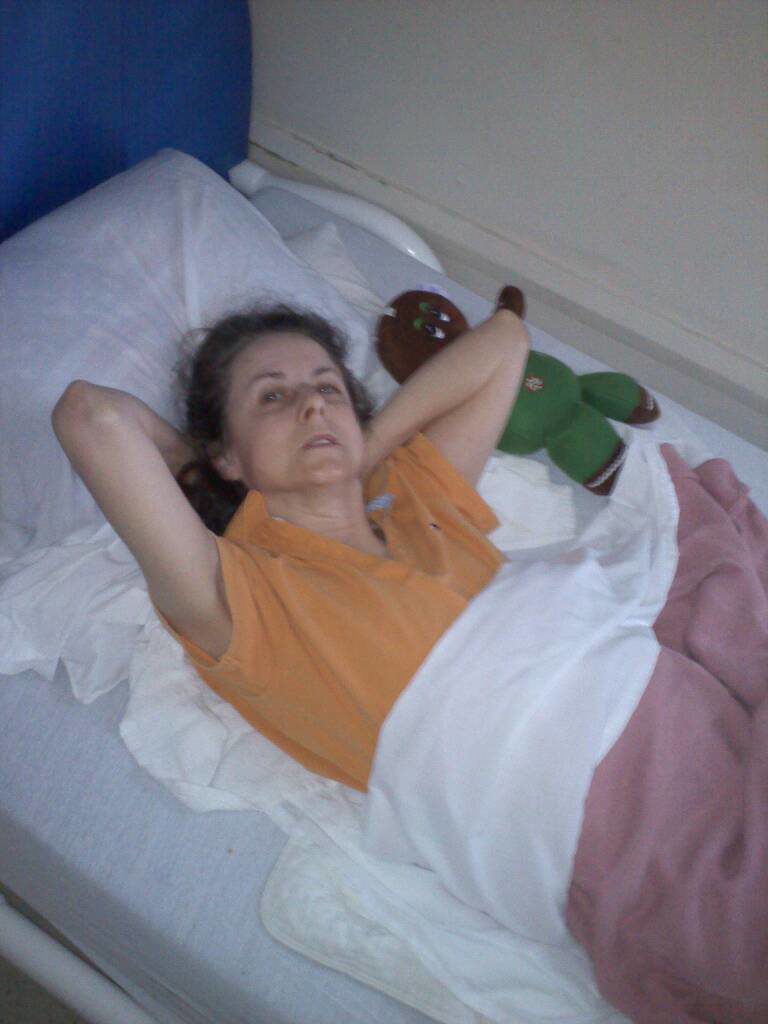
December 5, 2010
I decorated my mom’s room for Christmas yesterday while she laid in bed. All she needs for Christmas, besides a cure for Alzheimer’s, of course, is a vinyl upholstered recliner for her room.
I stopped by the nursing home briefly after attending a meeting for work in San Marcos. She talked to me a little while I was there, but she is difficult to understand because she clenches her jaw and talks through her teeth. When I started to leave, I looked back at her, and she reached out her arm to me, so I went back and held her hand.
“Oh, thank you,” she said, and tightened her grip on my hand. I wondered if she was really aware enough to not want me to leave, and I felt terrible that I had to hurry back to Austin to pick up newsletters for work before the print shop closed.
January 4, 2011
Despite my mother’s early onset Alzheimer’s disease, she was lively and spirited when I visited her yesterday evening. She was in bed, talking and giggling to herself when I arrived.
One of the aides, Paul, came in with a tray holding her dinner and helped her into a wheelchair. He came back to check on us several times while I fed her. She ate very well but would not hold any of her silverware and only picked up food with her hands and held her drink a few times.
She clasped her hands together during most of her meal, chewing well and stopping at random moments to talk or laugh. And she also paused a few times to touch my face and hair and once took my glasses off. Twice, she tried to tell me I was sweet, but it came out more like “You are smeet.”
Meanwhile, Otis, a white-haired, overall-wearing resident, paced up and down the hallway past her doorway. Twice, she waved at him, and he waved back. Once, she looked at him and remarked, “That’s Grandpa.” I was going to take her Christmas decorations home but changed my mind when I heard her mumble something including the phrase “Christmas tree.”
Once she had eaten all of her meat and steamed vegetables and most of her rice and tortillas and drank all of her cranberry juice and half of her iced tea, an aide came in to feed her medicine disguised in chocolate pudding. Then Paul changed her and put her in pajamas. I put shoes on her and walked her up and down the hallway for almost 15 minutes before I returned to Austin. She walked fairly well but did not let go of my hand for the first 10 minutes.
February 2, 2011 – Walking and Brushing Her Teeth
I spent more than two hours at my mother’s nursing home on Friday. It took a little while to get her sitting up in bed and then standing. I sat her in her recliner and put her tennis shoes on. She will not get herself out of bed and needs constant supervision while walking, as she never looks down and runs into objects low to the ground.
When I walked her out of her wing and into the center of the nursing home, several staff members were shocked to see her walking. I told them, “She can walk. They just never get her out of bed.” After repeated prompting over the last few weeks, the nursing home began a restorative program for my mother last week, making sure that my mother be walked around for about 15 minutes 6 days a week. I brushed her teeth while I was there. I was sad to see how much her gums bled because of neglect.
She seemed content but was less talkative than at my last visit. She said “thank you” and “yes” a few times, as usual.
Before leaving Friday, I was able to discuss her newly instated walking plan with her restorative aide and then with the nursing home’s care plan director and social worker. The care plan director also responded to my continued concerns about my mother’s dental health with a physician’s order for brushing her teeth every morning and night. I left feeling very reassured and hope that the walking and teeth brushing continue as planned. Unfortunately, the care plan director is leaving this Friday for a different job, but she assured me that the nurse taking over for her will be well informed about each resident’s care plan.
February 17, 2011 – Human Interaction
My mother’s face lit up when I walked into her room at the nursing home on Saturday. She held my hand, with her eyes fixed on my face, while I knelt beside her bed for about 15 minutes. I know that these moments of human interaction, however brief, are so important to my mother. She is isolated from society by Alzheimer’s disease. I was on my way home from helping my grandmother at a doll show in New Braunfels. I didn’t stay long because I had a pounding headache and a sick dog at home.
My mother was happy and talkative but difficult to understand as usual. I heard “babies” once and “..but the baby” a few minutes later but have no idea what she was trying to say. I talked about my dogs and asked if she had a dog, and she said “No, I left my house.” I said, “Is the dog at your house?” She said, “Yes.”
Before I left, Paul, one of the aides in her wing, brought in her tray of dinner. He said he would return in a few minutes to feed her. He is one of her favorites. I asked if she was hungry, and she said, enthusiastically, “Yes, Yes!”
I know that my mother has not really recognized me for sometime now but she is usually happy to see me. And I think she craves human interaction in general because she spends most of her time in bed in her room by herself.
March 29, 2011
I haven’t called her “Mom” in a long time, I realized as I was sitting in my mother’s room at the nursing home a week ago. I call my mother by her name because she doesn’t respond to “Mom” anymore. My mother’s early onset Alzheimer’s disease has robbed her of the knowledge that she is a “mom.”
I was fortunate enough to have the company of a friend on last Tuesday’s visit. She has been my mentor through the women’s ministry at our church for several months now and wanted to “meet” my mother, if you can call it that. What she really met is a helpless, childlike version of my mother, who doesn’t seem very much like my mother at all.
We found her sitting in her recliner in her room and walked her outside for a little sunshine. She quickly became tired so we returned to her room, where I fed her most of her dinner and some of her juice before she fell asleep in the recliner. While she was still awake, she seemed content but I was troubled by the sounds of her cough, which indicated chest congestion, and teeth grinding, both of which I discussed with her nurse the next morning.
As we left the nursing home, my friend asked me if it was difficult to see her like this. I told her that it used to be upsetting but now that she is content, it doesn’t bother me. And I realized that, having already grieved the loss of my mother, I now think of that tiny woman at the nursing home who looks somewhat like my mother as someone else entirely.
April 15, 2011
I made a quick visit to my mother’s nursing home for her care plan review on Wednesday. She was sleeping peacefully in her recliner. My favorite nurse Lynn, who just returned from being out sick with pneumonia, said, “She gets her belly full and goes to sleep” after breakfast each morning. My mom woke up just long enough to open her eyes and smile at me and then fell back asleep.
She normally eats breakfast and lunch in the main dining room of her secure wing. My mother continues to eat dinner in her room, away from distractions. She has gained 12 pounds in the last three months, due mostly to the fact that they started feeding her double portions at meals, but she is still a tiny little thing. An aide in the restorative department walks her six days each week, usually in the afternoons. This has kept her muscles from being so stiff all the time and even seems to have improved her color (maybe because of better circulation?).

May 8, 2011 – Mother’s Day
I got a little choked up during church this morning when the preacher was recognizing mothers. It caught me off guard because I don’t remember being emotional last Mother’s Day. For a while, I have felt like every day is Mother’s Day. I am daily remembering and trying to honor her.
Maybe I was emotional today because I had a difficult and tiring week battling incompetence and poor communication of hospital staff while my anxious and vulnerable mother was in their care Monday night and all day Tuesday. I left the hospital Monday night, thinking she would be released back to the nursing home, after the ER doctor told me her drop in oxygen saturation was most likely due to a mucus plug (a.k.a. chest congestion). I found out in the middle of the night that she was admitted after sedation administered to keep her still for a chest scan dropped her blood pressure.
The next morning, after speaking by phone with her nurse, who had not yet read my mother’s chart, fed her or given her her normal medications, I returned to the hospital, fed my mother, and waited for hours for her assigned doctor to come speak with me. He did not believe she had Alzheimer’s, did not understand why she had been brought to the ER the night before, and wanted me to explain why she was taking each of the dozen medications she had been prescribed.
Fortunately, she is now back at the nursing home with staff that know and love her and is doing well. I filed a complaint against the hospital with the Joint Commission on Accreditation of Healthcare Organizations (JCAHO).
May 12, 2011 – Best Friends
My mother and I, both sister-less, had been extremely close as far back as I can remember. She became increasingly dependent on our friendship following my graduation from college and her diagnosis with Alzheimer’s disease in 2006.
The last really sweet moment I had with her happened a few months before we moved her into a facility in 2008. I was doing something on the computer in my home office. My mom was walking aimlessly around the room asking me questions. When she asked me another question, I said, “Yes, ma’m,” still focused on whatever I was working on. “You don’t have to talk me to like that. We’re best friends…or at least I thought we were,” she responded, obviously hurt by my impersonal response. “We are!” I told her, wishing I had not been so cold.
This was the beginning of the end of any real relationship with my mother. Soon she became so dependent on my dad that I was unable to take care of her without him around. It is common for victims of dementia to become extremely attached to their primary caregiver. This transition was difficult for me. My mother went from thinking I was her best friend to frequently not liking me very much and confusing me with other women.
One day not long after the “best friends” exchange, I drove her from my parents’ house to my house. She thought that she was teaching me to drive. She kept saying, “You need to slow down,” even though I was only going about 25 miles per hour through a subdivision. Once we were in my house, she gave my husband a report on the “driving lesson.” She repeatedly referred to me as “your sister.” Soon after, she began to confuse me with the woman my father had hired to watch her and sort through her endless piles of belongings during the weekdays. She told me once, “You can’t just go through other people’s stuff.” She even attempted to get out of my moving car a few times.
June 8, 2011 – Hospice Care
My mother was somewhat agitated when I arrived at the nursing home today. She was blowing air (a behavior that began a few months ago), mumbling anxiously, and squirming around on her bed. One of her favorite aides, Jonathan, got her to eat some pudding. Then, he handed it over to me to finish feeding her. By the time she finished the pudding, she was gazing at the puppies poster I put up in her room a week and a half ago. Jonathan told me that she stares at it frequently. It is so difficult to know what she sees and what she is still aware of despite having Alzheimer’s disease.
He put my mom in her new, high-backed wheelchair. It has a cushion to keep her from leaning forward and falling out. I wheeled her outside for a little sunshine. We soon returned to the air conditioning because the Texas heat was ridiculous.
During my 1.5-hour visit, I only got a couple of “yeah”s. One was in response to me asking if she saw the puppies while she was staring at them in bed.
I set up hospice care for my mother last Monday (a week and a half ago). This decision follows a gradual decline in her ability to swallow and signs of aspiration. My favorite nurse at the facility, Lynn, explained to me that Alzheimer’s patients normally end up with food and liquids in their lungs. They ultimately die of pneumonia. The nursing home is pureeing her foods, and a hospice nurse and aides come in to check on her and give supplemental care several times a week. But there is not much anyone can do about the aspiration.
This is the beginning of the end. As one of my mom’s nurses told me, when she goes is “between her and God.”
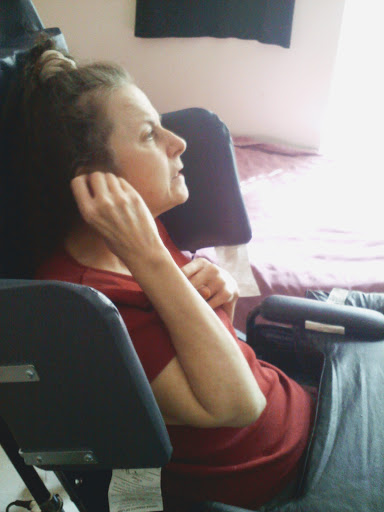
August 5, 2011
Now 15 and a half weeks pregnant, I am starting to get really excited about potential names and finding out if we are having a boy or girl. It is definitely an exciting (and busy) time in our life. But it is bittersweet knowing that my mother will not be the wonderful grandmother that I always thought she would be because she has Alzheimer’s disease.
I am not sure when my mother will leave this Earth but, even if she is still here next year, she will not really be able to meet her grandchild. In the late stages of Alzheimer’s disease, her mind is in another dimension. When I saw her a week and a half ago, it seemed that she is hallucinating most of the time now. She is often not even aware that someone is in her room.
September 16, 2011
I didn’t post about my last two visits to see my mom because they were pretty uneventful. She was pretty sleepy and unresponsive. This morning’s visit was much the same.
She is now aspirating much more frequently. This means that food and liquid is entering her lungs. This will eventually cause pneumonia (very common in late stage Alzheimer’s). The nursing home staff is usually able to feed her breakfast and sometimes lunch because she aspirates less earlier in the day. They are giving her thickened cranberry juice the consistency of honey throughout the day. The idea behind the thickened juice is that it gives her epiglottis more time to close. This theoretically keeps it out of her lungs but there are no guarantees. Her nurses and doctor also decided to stop her anti-psychotic and Alzheimer’s medications on Tuesday afternoon. The risks of her aspirating the pudding they crush them into outweigh their possible benefits to her at this end stage of the disease. However, they are still giving her Ativan for anxiety and morphine for pain as needed to keep her comfortable.
The restorative aide still checks on her 6 days a week and does range of motion exercises with her arms when she is not alert or stable enough to walk. The more she is able to move around instead of just laying in bed or sitting in her chair, the less likely she is to get pneumonia.
There is no way of knowing how many weeks or months she has left in late stage Alzheimer’s disease. In fact, she may have pneumonia several times before she passes. If (when) she does get it, they will give her antibiotics and hook her up to an oxygen machine (supplied in the nursing home by hospice) for breathing treatments. They will not pursue aggressive treatment in a hospital. In the meantime, my brother and I are making funeral arrangements so that we are prepared when the time comes. We are so ready for her to be at peace in her eternal home.
October 27, 2011
My mom’s condition seems to be pretty stable right now. She is eating 50 to 100 percent of her pureed meals and drinking most of her milk and cranberry juice (thickened to honey consistency) at each meal. Her anxiety is managed with topical ABH (Ativan Benadryl Haldol) gel applied to her arms or upper back three times per day. The staff also gives her Ativan and morphine occasionally as needed.
When I visited her Friday, she looked at me and lit up, smiling and laughing. It seemed as if she might recognize me on some level. A friend who recently lost her grandmother to Alzheimer’s aptly described it today as, “Her heart knows you but her mind doesn’t.”
November 21, 2011
My mother was sleeping peacefully while I was at the nursing home for her quarterly care plan review on Wednesday afternoon.
She is still eating and drinking well (double portions of pureed meals and liquids thickened to honey consistency). She is maintaining a decent weight (currently 114 lbs) and has been more alert and responsive for the last two or three weeks. This is probably related to what the hospice nurse calls her “drug holiday” (ending her previous 9-medication regimen) and the restart of her thyroid medication for hypothyroidism (wisely advocated by my brother). She aspirates her food and fluids much less when she is more alert.
Her anxiety continues to be managed with topical ABH (Ativan, Benadryl, Haldol) gel applied three times per day. Unfortunately, a daily pattern of agitation (mainly demonstrated through intense teeth grinding) around 11 a.m. has developed over the last couple of weeks. The nursing home staff may give her additional Ativan and/or morphine as needed for agitation but this causes sedation. It was decided on Wednesday that the hospice nurse would pursue a daily dose of Zyprexa Zydis, which dissolves on the tongue, for anxiety. Zyprexa has worked well for her in the past, and hopefully this medication will be started today. (It was supposed to start Saturday but there was some sort of hangup with the pharmacy that hospice uses.)
Her muscle function is continuing to deteriorate as her mind and body deteriorates in late stage Alzheimer’s disease. She spends most of her time in bed or in her wheelchair. She is no longer able to walk very far, as she is losing strength in her torso and leans badly to one side. The restorative aide still does range of motion exercises with her six days per week. But the aide is now more successful in doing exercises with her arms than with her legs. It is important that she moves as much as possible to keep food, bacteria, etc. from settling in her lungs and causing pneumonia.
The hospice nurse is helping me to advocate for daily attempts at dental care by the nursing home staff, even though it can often be difficult to get my mom to open her mouth. Dental health is important for preventing pneumonia by minimizing the amount of bacteria in her mouth.
 December 7, 2011
December 7, 2011
One of my mother’s best friends, Cheryl, went with me to visit my mother on Thursday. I decorated her room for Christmas and fed her lunch. Then we wheeled her outside where Cheryl trimmed her hair. My mother was animated and talkative (although her words were mostly unintelligible) through lunch. She ate almost all of her pureed meal and drank most of her honey-consistency cranberry juice, milk and water. By the time her haircut was complete, she was ready for a nap. The aides changed her and put her into bed.
I don’t know if she is aware of the Christmas decorations in her room. But I pray that Christmastime still makes her heart happy in some small way.
December 23, 2011 – Seizures in Late Stage Alzheimer’s
Just when I thought I had this Alzheimer’s thing figured out, my mother’s disease threw me for a loop once again. Yesterday afternoon she had a seizure lasting about 3 minutes and bit her lip. The nursing home staff cleared some flim out of her throat and hooked her up to oxygen. She fell soundly asleep. This morning she seems to be back to her normal status. But she is now taking the seizure medication Dilantin in hopes that she will not have more seizures.
Before yesterday, I had no idea that seizures were associated with Alzheimer’s. I learned that they are actually common in the later stages of the disease, especially in early onset patients. My mother was previously on the seizure medication Depakote for impulse control. It is possible that she would have been having seizures before now without that medication.
January 19, 2012
Less than a week from Baby Girl’s due date, I am 50 percent effaced (and have been for weeks) and zero percent dilated. Yesterday after my 39-week obstetrician appointment, I had an unusual and unexpected urge to call my mom. I’ve heard that people who lose close friends or family members deal with this. But I never really experienced this with my mom because losing her to Alzheimer’s disease has been fairly gradual. I have become accustomed to not having a relationship with my mother. But yesterday I was really missing that relationship. I wished she could weigh in on my upcoming labor and the possibility of induction.
Sadly, I also realized yesterday that my most recent diaper changing experience was a few years ago with my mom. It was quite a role reversal between mother and child. I am looking forward to having a normal mother-child relationship with my daughter. I pray that she will never have to care for me in the way that I have cared for my mom, at least not before she raises children of her own.
Yesterday, Baby Girl’s due date (based on conception, although the obstetrician’s official due date for her is tomorrow) came and went without her arrival. My mother-in-law took me to visit my mom for the first time in weeks (and probably the last time for a month or two). My mom, who has advanced Alzheimer’s disease, was calm and fairly alert, speaking very little but laughing several times.
The Dylantin (anti-seizure medication) seems to be working well–no more seizures, no more teeth grinding and much less agitation. The nursing home staff only apply the ABH gel in the evenings now because she is so calm.
 January 24, 2012 – Due Date with Baby Girl #1
January 24, 2012 – Due Date with Baby Girl #1
My mother-in-law and I took turns feeding my mom until I noticed that her eyes were watering, which is a sign of aspiration. She ate most of her food and drank all of her cranberry juice (thickened to honey consistency). Then she started to seem sleepy and stopped opening her mouth enough to eat or drink. We took her back to her room and expect that she took a nap when we left. I did notice that she had some sinus congestion, probably from allergies. I asked her nurse to give her an antihistamine or decongestant. But overall, my mom seems to be doing very well, all things considered.
May 22, 2012 – Late Stage Alzheimer’s Disease
My mother has been on hospice care for late stage Alzheimer’s disease for about a year now. Some nights I cry myself to sleep. I ask God to either give her back to me or to take her to her eternal home. I have learned to live without a relationship with my mom (once my best friend and number one confidant). I am focusing instead on my relationship with my husband and now on nurturing my daughter. But living without my mother is so strange because she is still physically present on this Earth.
My mother is “here” but trapped in a world we don’t have access to. She sees people and things we don’t see and laughs at jokes we don’t hear.
Tomorrow, the nursing home staff will move my mom from the room she has occupied in their secure wing for the last 3.5 years to a freshly painted room in the main nursing home. Since she is no longer ambulatory, she no longer “qualifies” for the secure wing. I was hesitant to allow the change at first. But, after consulting with staff at the facility and my family members, I decided the change might actually be a good thing. The secure wing is crowded and can be very chaotic because it contains so many residents who have behavior issues caused by dementia or brain injuries.
October 12, 2012 – Identity in Christ, Not Alzheimer’s
Two weeks ago, our pastor discussed Saul/Paul’s conversion in Acts. He pointed out that, when we accept Christ as our savior, our identity is no longer based on our past but instead on Christ’s past and future. I knew this before but it has never affected me the way it did that Sunday morning. “That is an interesting concept in the context of Alzheimer’s,” I whispered excitedly to my husband.
For several years, I have mourned the loss of my mother’s dignity and identity, because I know she has lost so many of her memories. How comforting it is to realize that she has not lost her treasured and all-encompassing identity in Christ. I strongly believe that the Holy Spirit continues to dwell within my mother and that her eternal identity is with Christ.
I visited her today and fed her lunch. I spoke to her about all of her best friends I had seen the night before. She seemed to be listening and, several times, she tried to speak to me. I wish I knew what she was trying to say. I wish she could interact with my daughter. And I wish she could interact with me. But I have renewed hope in the faith that Jesus Christ lives within her. I know he is using her earthly presence in ways I cannot fathom. Filled with the Holy Spirit, she is never alone.

December 10, 2012 – Christmas Music
Last week I took Christmas to my mom in the nursing home. I brought the usual decorations for her room–a small tree with unbreakable ornaments, snowmen and Snoopy. But this year, I brought something extra special–an mp3 player filled with her favorite Christmas music (and headphones, of course). I was inspired by a piece on The Doctors TV show about the effects of music therapy on the brain and the benefits for Alzheimer’s patients.
The Judds is my all-time favorite Christmas album, and “Beautiful Star of Bethlehem” is my all-time favorite Christmas song. I remember listening to The Judds and Bing Crosby albums over and over with my mom in the weeks leading up to Christmas each year throughout my childhood. She especially loved Bing Crosby’s “Christmas in Killarney” and “Mele Kalikimaka.” Unfortunately, I didn’t get to see her reaction to the music because she was falling asleep after lunch. But our favorite nurse set it up for her later and said she seemed to enjoy it.
December 12, 2012 – MP3 Player
Our favorite nurse sets up the mp3 player for my mom every weekday afternoon. She says my mom obviously enjoys it. My mother definitely notices and looks puzzled when she (the nurse) turns it off and takes it away when she goes home for the day!
June 14, 2013 – End Stages of Alzheimer’s Disease
It’s strange to try to plan for your mother’s passing while also planning the arrival of a baby. Honestly, I thought she was going to leave us soon when I was pregnant with Baby Girl. But two years later, here we are.
In the end stages of Alzheimer’s disease, my mother is declining. She is losing her ability to swallow, and, as a result, has lost 7 pounds in the last 6 weeks. The nursing home staff is unable to give her much food or fluids. I don’t think she will survive more than a few months if her weight loss continues at this rate.

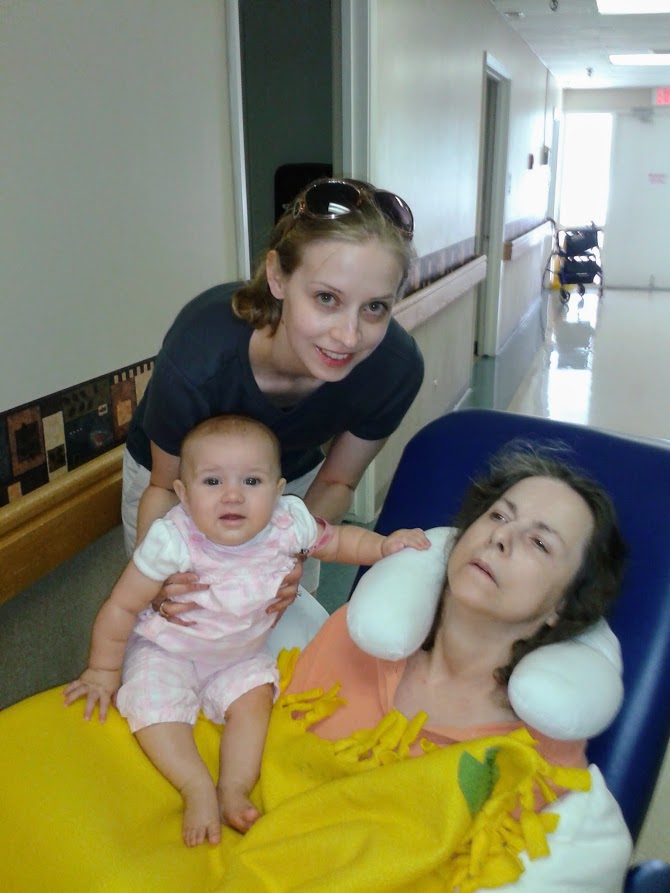

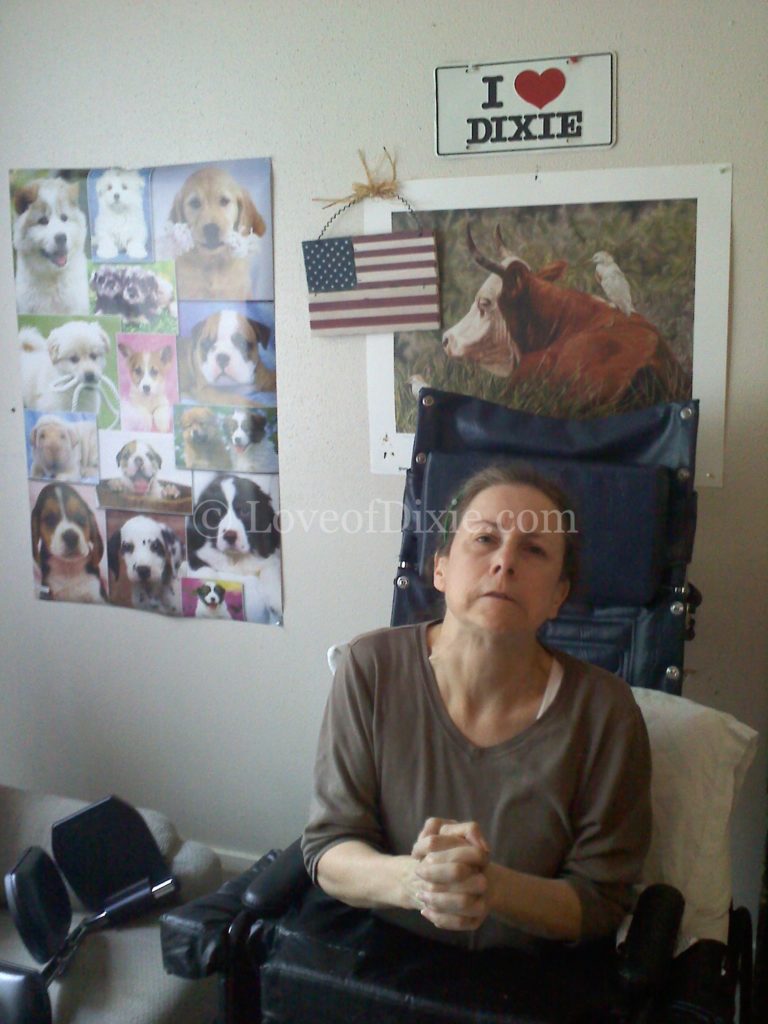
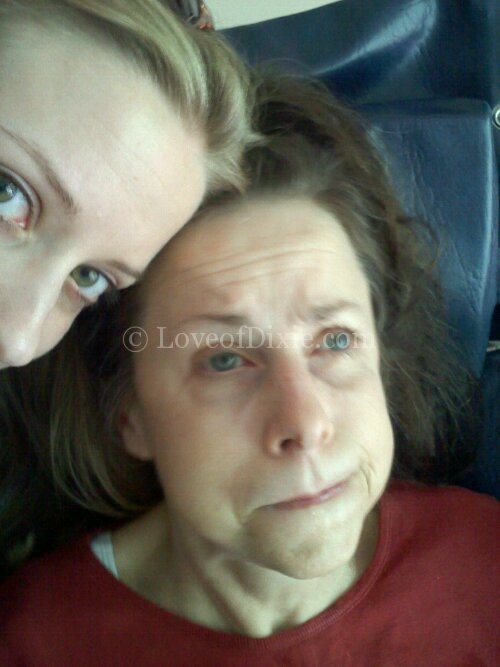
 December 7, 2011
December 7, 2011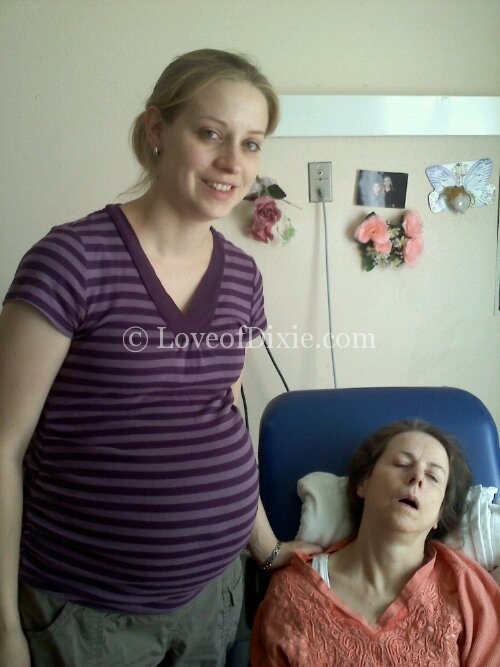 January 24, 2012 – Due Date with Baby Girl #1
January 24, 2012 – Due Date with Baby Girl #1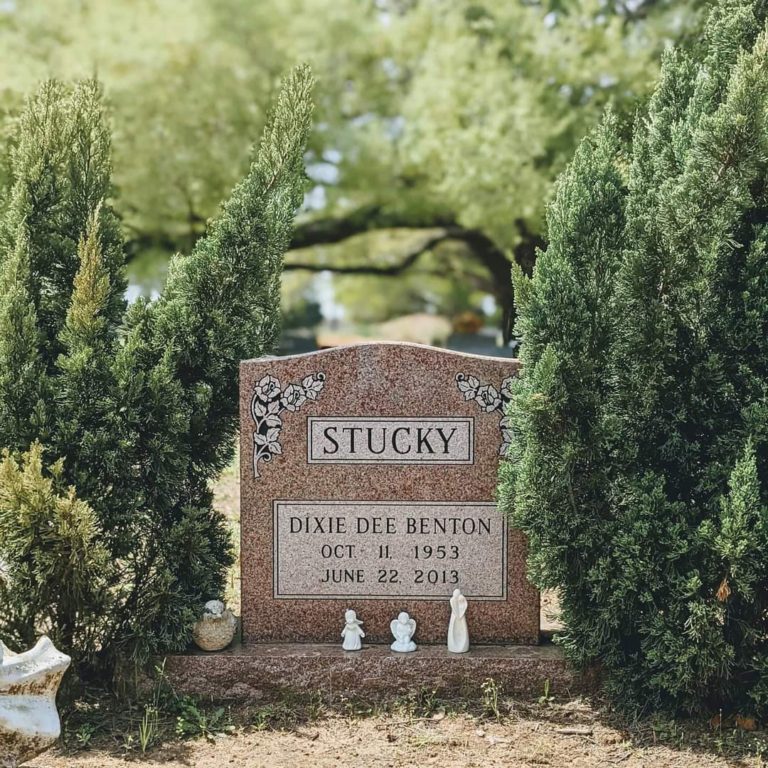



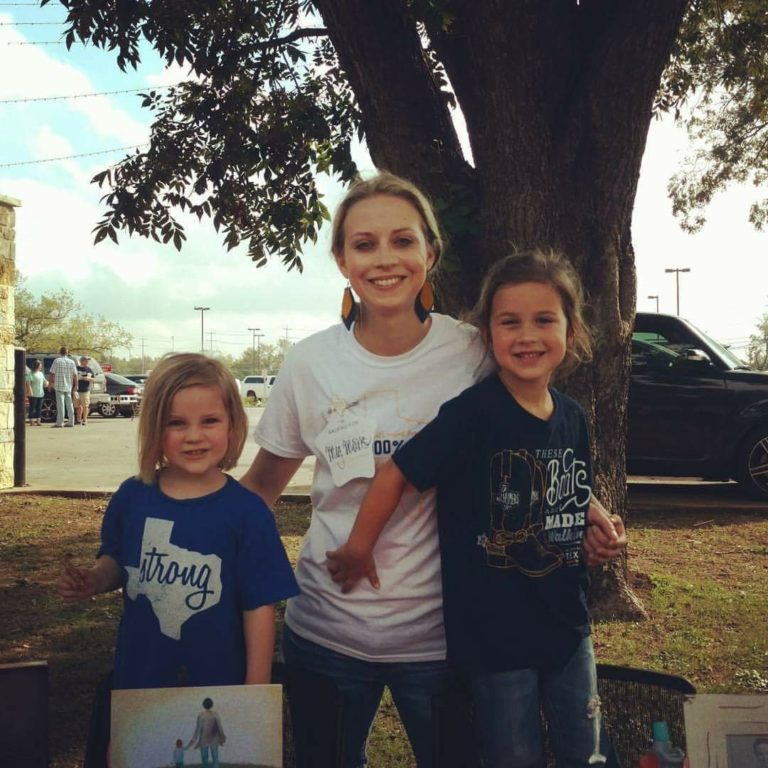

>You have forgotten the most important thing she gets enjoyment from – your visits. I know she must feel in her heart your love and concern each time she is with you.